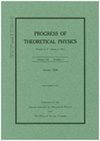A Practical Method of Solving Cutoff Coulomb Problems in Momentum Space --Application to the Lippmann-Schwinger Resonating-Group Method and the pd Elastic Scattering--
引用次数: 5
Abstract
A practical method to solve cut-off Coulomb problems of two-cluster systems in the momentum space is given. When a sharply cut-off Coulomb force with a cut-off radius $\rho$ is introduced at the level of constituent particles, two-cluster direct potential of the Coulomb force becomes in general a local screened Coulomb potential. The asymptotic Hamiltonian yields two types of asymptotic waves; one is an approximate Coulomb wave with $\rho$ in the middle-range region, and the other a free (no-Coulomb) wave in the longest-range region. The constant Wronskians of this Hamiltonian can be calculated in either region. We can evaluate the Coulomb-modified nuclear phase shifts for the screened Coulomb problem, using the matching condition proposed by Vincent and Phatak for the sharply cut-off Coulomb problem. We apply this method first to an exactly solvable model of the $\alpha \alpha$ scattering with the Ali-Bodmer potential and confirm that a complete solution is obtained with a finite $\rho$. The stability of nuclear phase shifts with respect to the change of $\rho$ in some appropriate range is demonstrated in the $\alpha \alpha$ resonating-group method (RGM) using the Minnesota three-range force. An application to the pd elastic scattering is also discussed.求解动量空间中截止库仑问题的一种实用方法——在Lippmann-Schwinger共振群法和pd弹性散射中的应用
给出了求解动量空间中双簇系统截止库仑问题的一种实用方法。当在组成粒子水平上引入截断半径为$\rho$的急剧截断的库仑力时,库仑力的双簇直接势一般成为局部屏蔽的库仑势。渐近哈密顿量产生两种类型的渐近波;一个是在中程区域具有$\rho$的近似库仑波,另一个是在最远程区域具有自由(无库仑)波。这个哈密顿行列式的常数朗斯基行列式可以在任意区域内计算。我们可以利用Vincent和Phatak提出的尖锐截断库仑问题的匹配条件,对屏蔽库仑问题的库仑修正核相移进行评估。我们首先将该方法应用于具有Ali-Bodmer势的$\alpha \alpha$精确可解的散射模型,并证实了用有限的$\rho$得到了完全解。在使用明尼苏达三量程力的$\alpha \alpha$共振群法(RGM)中,证明了核相移相对于$\rho$在一定范围内变化的稳定性。并讨论了在pd弹性散射中的应用。
本文章由计算机程序翻译,如有差异,请以英文原文为准。
求助全文
约1分钟内获得全文
求助全文

 求助内容:
求助内容: 应助结果提醒方式:
应助结果提醒方式:


